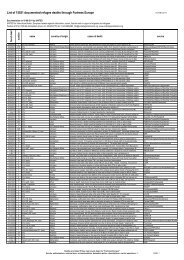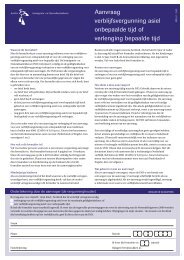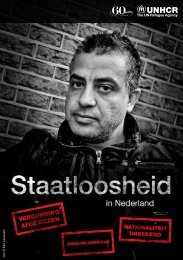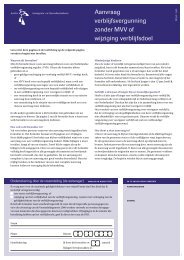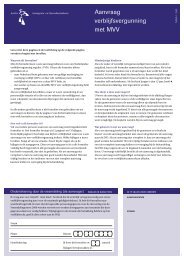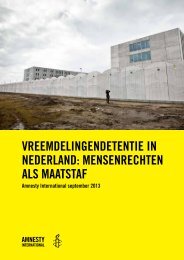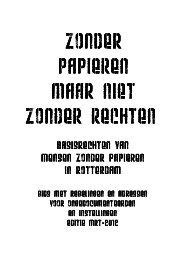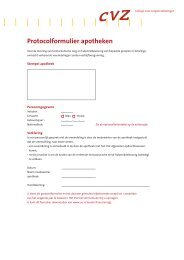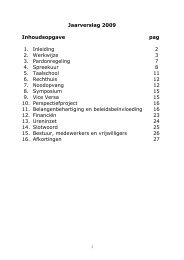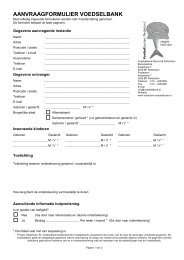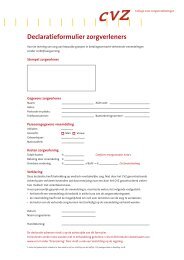Handboek voor begeleiders van vluchtelingen en ... - Stichting ROS
Handboek voor begeleiders van vluchtelingen en ... - Stichting ROS
Handboek voor begeleiders van vluchtelingen en ... - Stichting ROS
Create successful ePaper yourself
Turn your PDF publications into a flip-book with our unique Google optimized e-Paper software.
APPENDIX C<br />
UNHCR REVISED GUIDELINES ON APPLICABLE CRITERIA AND<br />
STANDARDS RELATING TO THE DETENTION OF ASYLUM<br />
SEEKERS1<br />
(February 1999)<br />
Introduction<br />
1. The det<strong>en</strong>tion of asylum-seekers is, in the view of UNHCR inher<strong>en</strong>tly undesirable.<br />
This is ev<strong>en</strong> more so in the case of vulnerable groups such as single wom<strong>en</strong>, childr<strong>en</strong>,<br />
unaccompanied minors and those with special medical or psychological needs.<br />
Freedom from arbitrary det<strong>en</strong>tion is a fundam<strong>en</strong>tal human right and the use of<br />
det<strong>en</strong>tion is, in many instances, contrary to the norms and principles of international<br />
law.<br />
2. Of key significance to the issue of det<strong>en</strong>tion is Article 31 of the 1951 Conv<strong>en</strong>tion 2.<br />
Article 31 exempts refugees coming directly from a country of persecution from being<br />
punished on account of their illegal <strong>en</strong>try or pres<strong>en</strong>ce, provided they pres<strong>en</strong>t<br />
themselves without delay to the authorities and show good cause for their illegal <strong>en</strong>try<br />
or pres<strong>en</strong>ce. The Article also provides that Contracting States shall not apply to the<br />
movem<strong>en</strong>ts of such refugees restrictions other than those which are necessary, and<br />
that any restrictions shall only be applied until such time as their status is regularised,<br />
or they obtain admission into another country.<br />
3. Consist<strong>en</strong>t with this Article, det<strong>en</strong>tion should only be resorted to in cases of<br />
necessity. The det<strong>en</strong>tion of asylum-seekers who come "directly" in an irregular<br />
manner should, therefore, not be automatic, or unduly prolonged. This provision<br />
applies not only to recognised refugees but also to asylum-seekers p<strong>en</strong>ding<br />
determination of their status, as recognition of refugee status does not make an<br />
individual a refugee but declares him to be one. Conclusion No. 44(XXXVII) of the<br />
Executive Committee on the Det<strong>en</strong>tion of Refugees and Asylum-Seekers examines<br />
more concretely what is meant by the term "necessary". This Conclusion also<br />
provides guidelines to States on the use of det<strong>en</strong>tion and recomm<strong>en</strong>dations as to<br />
certain procedural guarantees to which detainees should be <strong>en</strong>titled.<br />
4. The expression "coming directly" in Article 31(1), covers the situation of a person<br />
who <strong>en</strong>ters the country in which asylum is sought directly from the country of origin,<br />
or from another country where his protection, safety and security could not be assured.<br />
It is understood that this term also covers a person who transits an intermediate<br />
country for a short period of time without having applied for, or received, asylum<br />
there. No strict time limit can be applied to the concept "coming directly" and each<br />
case must be judged on its merits. Similarly, giv<strong>en</strong> the special situation of asylumseekers,<br />
in particular the effects of trauma, language problems, lack of information,<br />
previous experi<strong>en</strong>ces which oft<strong>en</strong> result in a suspicion of those in authority, feelings of<br />
insecurity, and the fact that these and other circumstances may vary <strong>en</strong>ormously from<br />
one asylum seeker to another, there is no time limit which can be mechanically applied<br />
or associated with the expression "without delay". The expression "good cause",<br />
requires a consideration of the circumstances under which the asylum-seeker fled. The<br />
term "asylum-seeker" in these guidelines applies to those whose claims are being<br />
72




